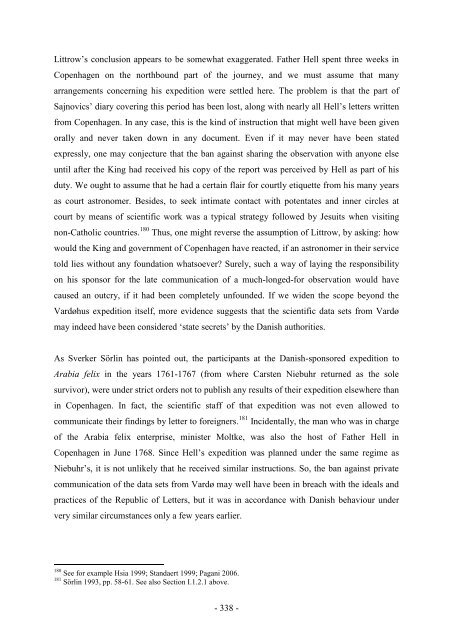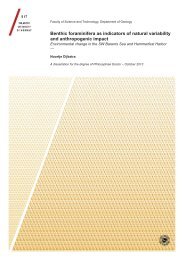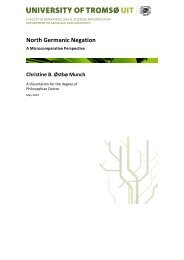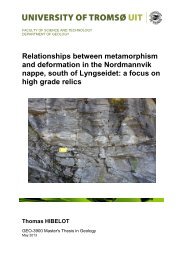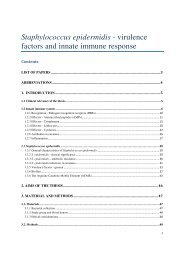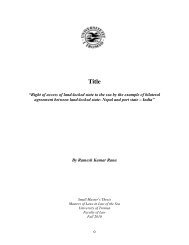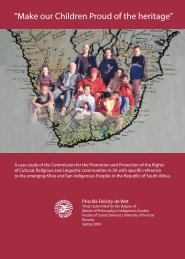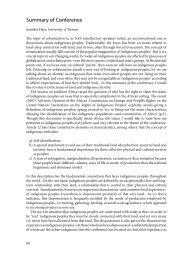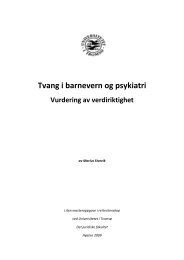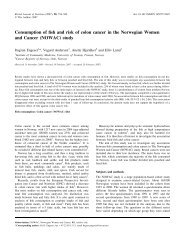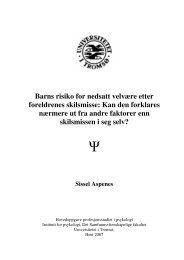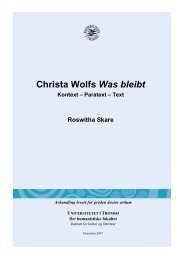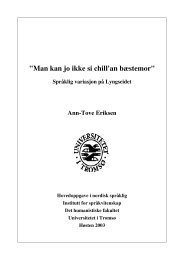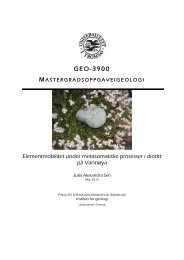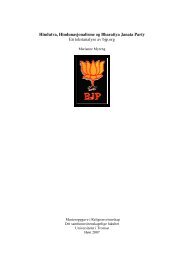- Page 3:
Maximilianus Hell (1720-1792) and t
- Page 6 and 7:
PART II The Eighteenth-Century Tran
- Page 8 and 9:
ACKNOWLEDGEMENTS This study of the
- Page 11 and 12:
Part I INTRODUCTION AND BIOGRAPHICA
- Page 13 and 14:
themes with concluding remarks at t
- Page 15 and 16:
to take the modern borders as their
- Page 17 and 18:
A final ambition of this study is m
- Page 19 and 20:
Society of Jesus; 3) He was freed f
- Page 21 and 22:
much more cursory, at times even do
- Page 23 and 24:
called ‘German Assistancy’, tha
- Page 25 and 26:
Kremsmünster Observatory, Father A
- Page 27 and 28:
deliver adjustments of the current
- Page 29 and 30:
Sven Widmalm investigates the histo
- Page 31 and 32:
Lomonosov and Rumovskii. 33 A more
- Page 33 and 34:
his entire printed œuvre in additi
- Page 35 and 36:
this challenge Pinzger tried to mee
- Page 37 and 38:
More recent, source-based contribut
- Page 39 and 40:
Pieces for the puzzle of an overall
- Page 41 and 42:
comparative perspective is a means
- Page 43 and 44:
McClellan maintains that the widesp
- Page 45 and 46:
discoveries, the Protestant movemen
- Page 47 and 48:
under the name Novi Commentarii) un
- Page 49 and 50:
works or not are equally problemati
- Page 51 and 52:
The fate of the manuscripts of Maxi
- Page 53 and 54:
Saint Petersburg, Anders Planman in
- Page 55 and 56:
I.2 MAXIMILIANUS HELL SJ (1720-1792
- Page 57 and 58:
stations in his life, information f
- Page 59 and 60:
Hell’s journal Ephemerides Astron
- Page 61 and 62:
freemasonry, religious toleration a
- Page 63 and 64:
family, and adds that he was nation
- Page 65 and 66:
Jesuits professors were teaching an
- Page 67 and 68:
activity until the suppression of t
- Page 69 and 70:
onibus et problematibus aucta (‘J
- Page 71 and 72:
Jesuit University in Tyrnavia. 48 T
- Page 73 and 74:
- 63 -
- Page 75 and 76:
etween 1579 and 1606 was re-opened.
- Page 77 and 78:
from 1780). As for timing, in Janua
- Page 79 and 80:
the university building. In a lette
- Page 81 and 82:
This task, to make “daily observa
- Page 83 and 84:
If Hell edited the official calenda
- Page 85 and 86:
You spent more of Your time on obse
- Page 87 and 88:
demonstrate how the Roman-Catholic
- Page 89 and 90:
Even though electromagnetism in the
- Page 91 and 92:
international arena. A new importan
- Page 93 and 94:
- 83 -
- Page 95 and 96:
Franz appears to have devoted most
- Page 97 and 98:
Apart from Halloy, who was born in
- Page 99 and 100:
attach numerous other observations
- Page 101 and 102:
The examples of Josephus Mayr and N
- Page 103 and 104:
Collegii Academici Societatis Jesu
- Page 105 and 106:
In terms of publicising, there seem
- Page 107 and 108:
the Kingdom of Hungary until the la
- Page 109 and 110:
Hatvani responds a few weeks later
- Page 111 and 112:
not flourish in Austria. On the con
- Page 113 and 114:
textbooks in architecture in Latin
- Page 115 and 116:
to Hell’s role in this context, w
- Page 117 and 118:
The Nordic context of Hell’s invi
- Page 119 and 120:
long time because of astronomical o
- Page 121 and 122:
Hamburg. From Hamburg, they again c
- Page 123 and 124:
“my observations, which I have ei
- Page 125 and 126:
Pole” must designate something el
- Page 127 and 128:
observatory in Tyrnavia the year af
- Page 129 and 130:
his mentor with having been so “t
- Page 131 and 132:
esponsible for church services in t
- Page 133 and 134:
civilisation. In this situation, He
- Page 135 and 136:
FIG. 1a - 125 -
- Page 137 and 138:
FIG.1b - 127 -
- Page 139 and 140:
FIG. 1d FIG. 1c - 129 -
- Page 141 and 142:
FIG 2a FIG. 2b - 131 -
- Page 143 and 144:
edited during these years. What cam
- Page 145 and 146:
Society of Sciences in the same yea
- Page 147 and 148:
in keeping with the pro-Hungarian
- Page 149 and 150:
In Hell’s letters written during
- Page 151 and 152:
eason as her Prussian counterpart,
- Page 153 and 154:
was in any case insufficient to fin
- Page 155 and 156:
Hviid visited Vienna from 27 Octobe
- Page 157 and 158:
in no small measure thanks to the c
- Page 159 and 160:
Catholic cities and provinces, at t
- Page 161 and 162:
Numerous letters from Hell to the b
- Page 163 and 164:
In preceding sections, it has been
- Page 165 and 166:
estore the studies at the universit
- Page 167 and 168:
When in 1775 a collection of essays
- Page 169 and 170:
assistants and all the sailors of t
- Page 171 and 172:
Maskelyne, upon repeated requests f
- Page 173 and 174:
around the mid-eighteenth century.
- Page 175 and 176:
Despite radical changes in the inst
- Page 177 and 178:
The catalogue of “Jesuiten-Mathem
- Page 179 and 180:
At the dawn of the 1770s, the Jesui
- Page 181 and 182:
well as Hell’s adjunctus. In Nove
- Page 183 and 184:
died in Quinque Ecclesiae. 387 Afte
- Page 185 and 186:
However limited evidence we have on
- Page 187 and 188:
The above-mentioned damages that ha
- Page 189 and 190:
when certain Slovak writers classif
- Page 191 and 192:
Ephemerides Astronomicae in all cou
- Page 193 and 194:
Part II THE EIGHTEENTH-CENTURY TRAN
- Page 195 and 196:
year. For over a hundred years, his
- Page 197 and 198:
mechanics presented later in the sa
- Page 199 and 200:
A transit may last for several hour
- Page 201 and 202:
FIGURE 4 THE SHIFT OF VENUS‟ PATH
- Page 203 and 204:
FIGURE 6 DELISLE‟S METHOD Delisle
- Page 205 and 206:
the difference in latitude and long
- Page 207 and 208:
equired. In theory, the difference
- Page 209 and 210:
A few years after Halley wrote his
- Page 211 and 212:
Lalande 1764), 36 9.26″ (Audiffre
- Page 213 and 214:
where the senior astronomer Delisle
- Page 215 and 216:
Prior to the 1761 transit, Father H
- Page 217 and 218:
II.1.4 FATHER HELL ON LESSONS TO BE
- Page 219 and 220:
Veneris). The author of this rather
- Page 221 and 222:
ecognised as an able observer and c
- Page 223 and 224:
This means that the actual number o
- Page 225 and 226:
As to the number of individual obse
- Page 227 and 228:
TABLE 1 HELL 1761a COMPARED TO WOOL
- Page 229 and 230:
II.2 THE NORDIC REGIONS AND THE TRA
- Page 231 and 232:
foremost, the history of activities
- Page 233 and 234:
analyse the degree of success or fa
- Page 235 and 236:
same meridian. For this occasion, W
- Page 237 and 238:
than one place in this region. 22 T
- Page 239 and 240:
All three observers in Siberia - Ch
- Page 241 and 242:
prove insufficient to cover all the
- Page 243 and 244:
(1739-1781), covered the eastern an
- Page 245 and 246:
proposal of Lomonosov. The chief ar
- Page 247 and 248:
II.2.3 THE ROLE OF DENMARK IN THE V
- Page 249 and 250:
astronomer among its members and it
- Page 251 and 252:
Thus, Kratzenstein expected the Ara
- Page 253 and 254:
himself, along with Rødkier, Ahl,
- Page 255 and 256:
data published. Hammer‟s manuscri
- Page 257 and 258:
provide data of the utmost utility
- Page 259 and 260:
Norwegian garrison had been station
- Page 261 and 262:
way to Copenhagen. Even before he m
- Page 263 and 264:
newspaper article. It is stated, ho
- Page 265 and 266:
his destination with the necessary
- Page 267 and 268:
men, black slaves among them. 134 B
- Page 269 and 270:
eady on a hilltop nearby. The weath
- Page 271 and 272:
Kratzenstein has travelled to Trond
- Page 273 and 274:
enlarged 150 times. The first conta
- Page 275 and 276:
Arguably, these concluding lines ar
- Page 277 and 278:
The success was short-lived, howeve
- Page 279 and 280:
II.2.5 ASSESSMENT OF VENUS TRANSIT
- Page 281 and 282:
emained at a very high level in bot
- Page 283 and 284:
path of Venus, in order to mount a
- Page 285 and 286:
a number of inaccuracies in his sum
- Page 287 and 288:
TABLE 4a OFFICIAL SWEDISH REPORTS O
- Page 289 and 290:
II.3 THE ROLE OF FATHER HELL IN THE
- Page 291 and 292:
another edition to hand are advised
- Page 293 and 294:
In the year 1767, nothing was furth
- Page 295 and 296:
Neither claim is entirely correct.
- Page 297 and 298: effectively withdraws the invitatio
- Page 299 and 300: Lalande became one of the Venus-tra
- Page 301 and 302: singled out in several recent works
- Page 303 and 304: As explained in Section II.1.2 abov
- Page 305 and 306: in the ordinary method, stars of no
- Page 307 and 308: 1769, Hell speaks of a latitude of
- Page 309 and 310: Incidentally, Hell’s final conclu
- Page 311 and 312: The interior contact of egress is d
- Page 313 and 314: TABLE 5 THE CONTENTS OF THE VARIOUS
- Page 315 and 316: o’clock, as these operations came
- Page 317 and 318: the Supreme Being. I for my part wi
- Page 319 and 320: the official observatory of that ac
- Page 321 and 322: eputation, they had another thing i
- Page 323 and 324: Although the observations of Sajnov
- Page 325 and 326: The review is astonishingly positiv
- Page 327 and 328: moments, as well as the excellent m
- Page 329 and 330: epeated calculations as the various
- Page 331 and 332: the Parallax of the Sun Deduced Fro
- Page 333 and 334: the frequent letters he sent to War
- Page 335 and 336: calculations by Monsieur Lexell and
- Page 337 and 338: The strife ended there, with parall
- Page 339 and 340: TABLE 7 CHRONOLOGY OF PARALLAX CALC
- Page 341 and 342: II.3.5 THE NACHLEBEN OF HELL’S VA
- Page 343 and 344: Upon inspection of the ‘astronomi
- Page 345 and 346: of detecting errors in Littrow’s
- Page 347: trump card in his hand, for observa
- Page 351 and 352: Royale des Sciences (post-revolutio
- Page 353 and 354: Part III EDITIONS OF PRIMARY SOURCE
- Page 355 and 356: apparatus or appendix). Often, as i
- Page 357 and 358: discussions. 3 The main ambition of
- Page 359 and 360: ased on a sort of craving for rules
- Page 361 and 362: etc.; and a if necessary a guide to
- Page 363 and 364: I have designated the texts thus: L
- Page 365 and 366: connoisseurs, which I am going to p
- Page 367 and 368: III.1.3 THE EDITING OF THE UNFINISH
- Page 369 and 370: e listed exhaustively in the appara
- Page 371 and 372: III.2 THE CALL FOR SUBSCRIPTIONS TO
- Page 373 and 374: SCIENTIFIC EXPEDITION BY THE NORTH
- Page 375 and 376: The price cannot yet be established
- Page 377 and 378: OVERVIEW OF THE WHOLE WORK 1 entitl
- Page 379 and 380: Chapter IV. The activities in Copen
- Page 381 and 382: Chapter VII. On the transportation
- Page 383 and 384: VOLUME TWO. PHYSICAL. Volume two, p
- Page 385 and 386: PART THREE OF VOLUME TWO. On the ca
- Page 387 and 388: PART FIVE OF VOLUME TWO. Remarks on
- Page 389 and 390: VOLUME THREE. MATHEMATICAL AND ASTR
- Page 391 and 392: PART THREE OF VOLUME THREE. Observa
- Page 393 and 394: III.3 THE UNFINISHED INTRODUCTION T
- Page 395 and 396: Part One A diary of the entire Scie
- Page 397 and 398: Accordingly, the minds of astronome
- Page 399 and 400:
extremes in the duration — in oth
- Page 401 and 402:
For he 1 had been made to understan
- Page 403 and 404:
famous Mister Lexell, a[nother] son
- Page 405 and 406:
aware that the sites of observation
- Page 407 and 408:
1769 (a.). However, among the highl
- Page 409 and 410:
the transit would be located in the
- Page 411 and 412:
Dixon were chosen for this mission
- Page 413 and 414:
and astronomers recounted so far, d
- Page 415 and 416:
For as it later emerged, the Divine
- Page 417 and 418:
they decided to suggest to, and ind
- Page 419 and 420:
sited by the Arctic sea, to become
- Page 421 and 422:
As I rolled over in my mind these a
- Page 423 and 424:
to Her Highness the Empress, asking
- Page 425 and 426:
I should choose; this needed to be
- Page 427 and 428:
he was already a famous and well kn
- Page 429 and 430:
SUMMARY AND REFERENCES
- Page 431 and 432:
eceived increasing support in Centr
- Page 433 and 434:
items published before the year 180
- Page 435 and 436:
econstruct lost parts of their corr
- Page 437 and 438:
UNPRINTED SOURCES AND LITERATURE, 1
- Page 439 and 440:
Vardø 15 Jan 1769 MERCIER (Copenha
- Page 441 and 442:
Vienna 25 Mar ’80 J. BERNOULLI (B
- Page 443 and 444:
UNPRINTED SOURCES AND LITERATURE, 1
- Page 445 and 446:
FIXLMILLNER Cremif. [Mar-July 1783]
- Page 447 and 448:
(measurements of the magnetic decli
- Page 449 and 450:
MS, Excerpts from the works “Saxo
- Page 451 and 452:
UNPRINTED SOURCES AND LITERATURE, 2
- Page 453 and 454:
MS, [no heading] “Acceptis recent
- Page 455 and 456:
[Anonymous] 1767: “Transitus Vene
- Page 457 and 458:
1768: Voyage en Sibérie, fait par
- Page 459 and 460:
1761b: Elementa Arithmeticæ Numeri
- Page 461 and 462:
übersetzt, Dritter Band, pp. 171-3
- Page 463 and 464:
Kratzenstein, Christian Gottlieb 17
- Page 465 and 466:
Maskelyne, Nevil 1762: “An Accoun
- Page 467 and 468:
1774: “Förklaring På de Formler
- Page 469 and 470:
Trebuchet, Claude-Étienne 1766:
- Page 471 and 472:
2011a: “Nordiske amatørastronome
- Page 473 and 474:
Bennett, Jim 2002: “The travels a
- Page 475 and 476:
Bursill-Hall, Piers (ed.) 1993: R.
- Page 477 and 478:
Duhr, Bernhard 1892: Jesuiten-Fabel
- Page 479 and 480:
Firneis, Maria G. & Franz Kerschbau
- Page 481 and 482:
Harbsmeier, Michael 2003: “Indled
- Page 483 and 484:
Hundrup, F. E. 1854: Biographiske e
- Page 485 and 486:
Kragemo, Helge (Bergh) 1933: “Pat
- Page 487 and 488:
Ludwig, Walther 1997: “Die neuzei
- Page 489 and 490:
Nordenmark, N. V. E. 1939: Pehr Wil
- Page 491 and 492:
2006: “Sverige, vetenskapen och P
- Page 493 and 494:
Sajnovics, Johannes (Joannes, Johan
- Page 495 and 496:
Smagina, Galina Ivanovna 2007: “P
- Page 497 and 498:
Tibenský, Ján 1970: “Pokusy o o
- Page 499 and 500:
Vorontsov-Vel’yaminov, Boris A. 1
- Page 502:
ISBN xxx-xx-xxxx-xxx-x


